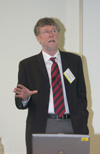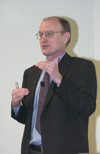|
EPP 2010: Strategies For Deciding Future of HEP In a day of meetings that could produce an impact for years to come, the National Academies' panel on Elementary Particle Physics in the 21st Century (EPP 2010) assembled in One West on Monday morning to begin listening — listening to how the national high-energy physics program fits into an international context; how Europe and Japan view issues of international connections; how Fermlab envisions its own future; how the proposed International
"We're not trying to make decisions experiment-by-experiment," said EPP 2010 chair Harold Shapiro of Princeton University. "Our goal is to establish broad priorities in the major fields of high-energy physics, in a scientific, international and budgetary context. We hope to suggest sensible strategies." The panel's charge, from the National Academies' Board on Physics and Astronomy, involves prioritizing scientific questions, and recommending a 15-year implementation plan with realistic, ordered priorities. In its two-year study, the panel has met previously in Washington DC (Nov. 30, 2004) and at SLAC (Jan. 31, 2005). The next meeting will be at Cornell University's Laboratory for Experimental Particle Physics (Aug. 2). Fermilab Director Michael Witherell emphasized that the field of particle physics sees "a scientific revolution in the making," with collider physics able to attack all the major themes in the challenge ahead: the quantum vacuum, the Higgs search, supersymmetry, and extra dimensions. Tight budgets have led to optimizing the operating program, but US high-energy physics "currently provides outstanding science for the investment." With the ILC as the model for the future, Witherell set the stakes for hosting the machine: the host country must make a special investment, but with it would come a special share of the credit for scientific discoveries. "For the US to continue as a leader in high-energy physics, that means hosting the ILC," he said. "HEP has been the driver for light sources, for neutron sources, for medical diagnostics. Physicists will go where the accelerators are. If we are not the host, then the US will not be a leader, and we will have a different role." Witherell said a
Albrecht Wagner, Director of DESY in Hamburg, Germany said an ILC Technical Design Report by the TESLA collaboration had produced an estimated cost for a 500 GeV machine of 3.8 billion Euros (about $4.8 billion). He called it "a very serious cost estimate," though adding that the ILC's Global Design Initiative, headed by Barry Barish, expects to complete its Conceptual Design Report next year with an estimated cost. Wagner offered "the greatest respect for those colleagues whose technology was not chosen, and yet have wholeheartedly changed the direction of their research to superconducting technology for the ILC." The ILC is the highest priority in Japan's HEP community, said KEK Director-General Yoji Totsuka. Japan established an ILC Forum in 2002 to coordinate cooperation with industry; the Forum currently includes 63 leading Japanese industrial companies. "Japan has a long history o f close cooperation with industry," Totsuka said, "and that will continue with ILC." Totsuka also noted that in 2004, the Asian Committee for Future Accelerators reconfirmed the importance of hosting the ILC in Asia, urging the Japanese government to support the ILC, and urging Asian countries to encourage their scientists to support the GDI effort.
Ian Halliday, former Director of the UK's Particle Physics and Astronomy
Research Council, humorously described his national heritage:
"I come from the country of Newton," he said, "which means that for
more than 300 years we've had this problem of, 'What in God's name
is this thing called mass?'" Then he cautioned the field of HEP
against losing sight of the big questions, citing what he learned
from working on commissions with eminent cosmologist Sir Martin
Rees. Said Halliday: "Sir Martin always said to keep thinking of the
simple questions, the big questions, the answers to which will be
in the text books for the next 100 years."
* * * |
| last modified 5/16/2005 email Fermilab |
FRLsDFx9eyfrPXgV

